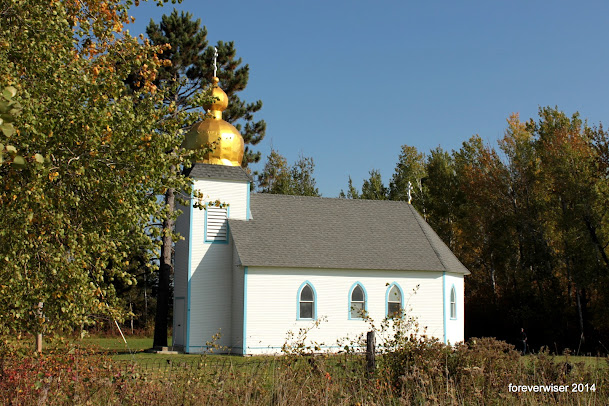Galatians #4 & #5 - Galatians 2:1-10; 11-21 - The 3 R's and "How much do I (Paul) believe this?"
Foreverwiser, CC BY-SA 3.0 <https://creativecommons.org/licenses/by-sa/3.0>, via Wikimedia Commons
The picture above is a church named after Peter and Paul. Actually there are many of these all over the world. It is a testament to these two men's love of proclaiming the gospel. It is also a testament that the correction in today's passage didn't end their relationship. This church is in Bramble, Minnesota.
This is a catch-up blog post so I am including material from 2 sermons in the book of Galatians and they will both be posted below.
In way of review, Paul's soap box is "Christ alone!" He wants to bring assurance to the new Christians in the new churches of the region of Galatia of their salvation in the simple gospel found in Galatians 1:3-5. The problem is that there are those who are trying to add to the gospel message to be Jesus + and Paul will have none of this.
Paul has met with the apostles privately and shared the gospel message he is sharing with the Gentiles and they added nothing to his message. He also had in his presence Titus, a Gentile Christian, who the apostles didn't compel to get circumcision as an "add on" to his salvation in Christ. The apostles and Paul concluded 3 times it was great that Paul would take this gospel to the Gentiles and Peter would take this same gospel to the Jews.
Assurance should be high that what was shared with them (the Galatian Christians) was the truth of the gospel but then Paul puts the cherry on the top. This is how much I believe what I am saying about "Christ alone." Previously he did not budge on this message being face to face with the false brothers in Galatians 2:5 but now he goes face to face with his brother Peter in Galatians 2:14 that the "truth of the gospel" would not be diminished.
What jumped out at me through this passage what how Paul confronted Peter on this issue. Peter was with the Gentile Christians but then separated himself from them to join the Jewish Christians who had arrived from James (Jerusalem). He did this out of fear. His action caused the other Jewish Christians with the Gentile Christians to also separate themselves and even our beloved Barnabas to do the same. What Jesus tore down, Peter was building back up. We are all one in Christ Jesus but Peter was stressing by his actions something very different. Paul steps in to address what he has just seen.
Timing can be crucial and powerful to address a problem as it is happening or soon after but how you address it is just as important. Paul sees the events unfolding and points out what is happening but then goes into an explanation of why it is wrong from the Scriptures. Grammatically Paul goes from "you" (Peter) to "we" (Peter and Paul) to "I" (Paul) in his correction. Paul gets Peter's attention and then he identifies with Peter as someone like him going through this transition and then he declares his resolution because of the sufficient work of Christ through His death and resurrection. Ephesians 3:4-6 (LSB) helps us to understand this shift that is God's plan.
About which, when you read you can understand my insight into the mystery of Christ,
which in other generations was not made known to the sons of men,
as it is now revealed to His holy apostles and prophets in the Spirit:
that the Gentiles are fellow heirs and fellow members of the body,
and fellow partakers of the promise in Christ Jesus through the gospel,
What was not known is now revealed to the apostles that there are not two groups but rather one group who are "in Christ." There is still two groups when it comes to those who are saved and those who are not saved, those who are of the light and those of the darkness, those who are sheep and those who are goats, those who are on His right and those who are on His left but when it comes to those who are "in Christ" there is to be no division. We are fellow heirs, members and partakers of the promise of Jesus Christ.
It is because of this truth revealed that Paul goes into all of his "I" statements in Galatians 2:20-21. The obvious question pops into my head, "Have I rebuilt what Jesus has destroyed?" "Have I treated other Christians as less than 'fellow' to me?" It makes me think of Peter later on calling the elders he is writing to in 1 Peter 5:1 as "fellow elders" rather than him being supreme over them. They are the same "in Christ."
With so many divisions in our world today let's not make another in the body of Christ. We may have differences that we can discuss and maybe even debate within the church but let us not make them an unnecessary division of Christ's body. The unity stays when we come back to our alignment with the gospel.
This is becoming a challenging book to me.
Adam




Comments
Post a Comment